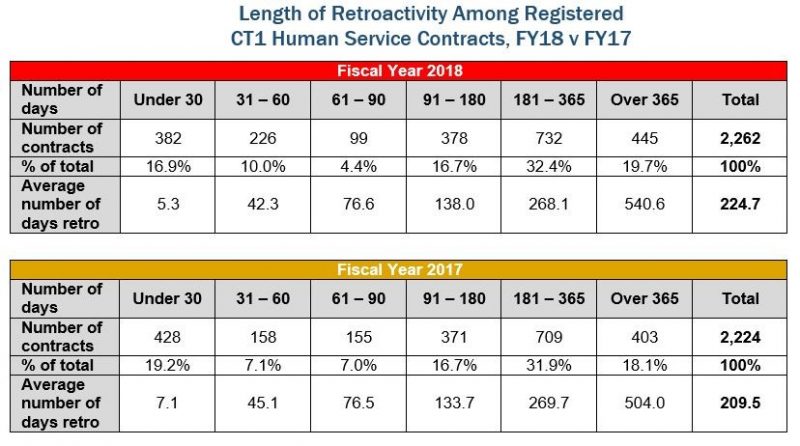Comptroller Stringer, Council Member Brannan and Advocates Call on City Charter Revision Commission to Make Sweeping Changes as Thousands of Non-Profits Go Unpaid by the City for Months

New Comptroller Stringer report shows administration submits 89% of City contracts for human services – serving the most vulnerable New Yorkers – late for registration, after the contract start date
In FY18, contracts submitted over a year late for registration were on average 589 days late
Coalition calls for strict contract processing timelines and new, transparent tracking system for all contracts
(New York, NY) — Today, New York City Comptroller Scott M. Stringer and Council Member Justin Brannan, joined by a coalition of advocates and non-profit organizations, called on the City Charter Revision Commission to make significant procurement reforms in the City Charter as a new report issued by the Comptroller’s Office, Still Running Late, found pervasive delays in the City’s contracting system. These delays are especially rampant among human services contracts – the main focus of the Comptroller’s report – with 89% of new and renewal contracts being submitted late for registration, which delays payments by the City. Yet, this problem does not only affect human services contracts – 80% of new and renewal contracts across all agencies and industries were submitted late in FY 2018.
Delayed contract registration causes serious problems because vendors can only receive payment once a contract is registered. The situation is particularly dire for non-profit human service organizations that serve some of the City’s most vulnerable populations – including seniors, the homeless, and children. Despite working with limited resources, these mission-driven organizations do not stop delivering meals to homebound seniors or providing shelter to homeless families when their contracts aren’t registered. Instead, cash-strapped non-profits often take out loans or put themselves at financial risk to continue offering services until contracts are registered and they can be paid.
“Non-profit organizations are the backbone of our city, supporting hundreds of thousands of New Yorkers that rely on them for food, shelter, and in some cases, survival. Yet many of the organizations these New Yorkers rely on are just one step away from financial disaster, and it’s a crisis of the City’s own making,” said Comptroller Stringer. “We must pay these organizations on time for the services they deliver. That’s why we need to reform our city’s contracting system to make sure contracts are reviewed and registered within strict timeframes, and that the process is transparent. The City Charter Commission has a real opportunity to not only help non-profits, but the residents who rely on their services.”
“Our city’s human service providers are in crisis due to a badly broken procurement system. We cannot continue asking these vital non-profit organizations to do more and more with less and less when we rely on them to provide essential services to New Yorkers who need it most. These organizations need to be paid on time and paid fairly for the critical work they do. Comptroller Stringer’s report clearly demonstrates that major reforms are needed to right this wrong. I strongly support the reforms laid out in the report and urge the City Charter Commission to act immediately,” said Council Member Justin Brannan.
The City’s procurement process involves oversight from a number of agencies before a contract can be registered with the Comptroller’s office. While oversight is crucial, the length of time it takes for a contract to work its way through all stages of review – most of which do not have deadlines – is a primary source of contract delays. Making matters worse, there is no public-facing system for tracking contracts as they make their way through the various stages of review, leaving non-profits and other vendors in the dark about the status of their contracts.
Vital Services Threatened by Late Human Services Contracts
The Comptroller’s report examined human services contracts, and found the City administration submitted 89% of them for registration after the contract start dates had already passed, and that more than half of these contracts were late by more than six months. What’s more, the latest contracts – those that were submitted by the City for registration more than one year after the contract start date – were even later in FY18 than they were in FY17, by an average of 37 days.
The report analyzes 2,262 human service contracts submitted by the administration for registration after their start date in FY18. As the chart below illustrates, over 52% of these contracts were submitted for registration six months or more after the contract start date had already passed (32.4% were more than six months late and another 19.7% were over a year late). Meanwhile, of the almost 20% of human service contracts that were submitted over one year late, the average number of dates late was a whopping 541.

Timeframes Work but are Non-Existent for Most Oversight Agencies
While the Comptroller’s report found widespread problems in the agency contracting process, by comparison, the analysis found that once contracts are submitted to the Comptroller’s Office by City agencies, 96% were registered within 30 days, as required by the City Charter.
To help alleviate the burden placed on non-profits and other vendors that wait months for contracts to make it through the City’s review process, Comptroller Stringer is calling on the City Charter Revision Commission to advance reforms including:
Instituting strict timeframes for City agencies with an oversight role in the procurement process to complete their tasks.
The Comptroller’s Office is currently the only agency with a role in the City’s procurement process that performs its duties within a specified timeframe (30 days). All other oversight agencies perform their tasks without mandated timeframes, or with timeframes that can be easily waived, which leads to a drawn out process and a lack of accountability among agencies.
Creating a transparent contract tracking system that would allow vendors to view the status of their contracts.
Non-profits and other vendors that do business with the City of New York have very limited visibility into the contracting process. Most vendors typically wait many months or longer for a contract to be registered, but have no idea what is actually happening to their contract during that time. To increase transparency, the City should create a tracking system that allows vendors to follow their contracts throughout each stage of the procurement process, and track how much time each agency is taking to execute their tasks.
“Once again, the NYC Comptroller’s annual report on contract delays will highlight the persistent problems that the human services sector faces with delayed contract registration. Lags in contract registration continue to be a serious concern for many of our agencies who are experiencing millions of dollars in unpaid claims. A concerted effort in streamlining and improving transparency in this process is necessary. These delays are only one part of the problem. Adequately funding of contracts is key to ensuring that the types of services our sector is proud to offer New Yorkers in need continues,” said Msgr. Kevin Sullivan of Catholic Charities of New York City.
“For years, The Human Services Council has been raising the impact of chronic late contracts. It feels like I am banging my head against a wall,” said Allison Sesso, Executive Director of the Human Services Council of New York. “The Comptroller’s report shines an important light on this issue and shows that there still has not been much improvement. Nonprofits cannot continue to operate in an environment where their payments are delayed. We cannot have an equitable City when the providers we count on to build up our communities have trouble meeting payroll because the City is not completing basic administrative tasks.”
“UJA-Federation of New York thanks Comptroller Stringer and City Council Contracts Committee Chair Brannan for their critical and timely work regarding late registration of NYC human service contracts. UJA works with numerous nonprofits delivering vital anti-poverty services, whose operations and effectiveness are seriously hampered by late registration of contracts. The human service sector also struggles with other government-created bureaucratic challenges, including underfunding, unpaid mandates and pay equity. UJA thanks the Comptroller and City Council for their important support in helping to address these serious challenges,” said Eric S. Goldstein, Chief Executive Officer of UJA-Federation of NY.
“City funds are vital for critical services that support New Yorkers from all walks of life, and any disruption or delay in contracts has a significant impact on the nonprofits and settlement houses that offer those services,” said Susan Stamler, Executive Director of United Neighborhood Houses. “The city’s constant lateness means programs are forced to jeopardize their own fiscal health and often take loans requiring interest payments. You can’t close a homeless shelter and you can’t reduce the number of meals you serve at a senior center while you wait for the city to pay your contract on time. It’s absolutely essential to end this cycle of delayed contracts and pay providers promptly for the essential work they do in our communities.”
###